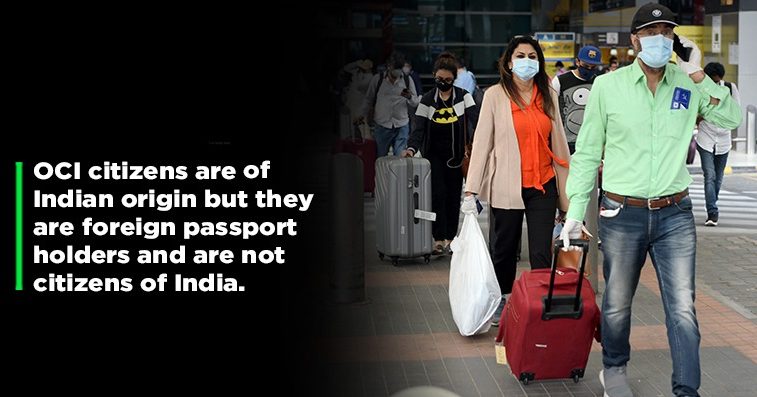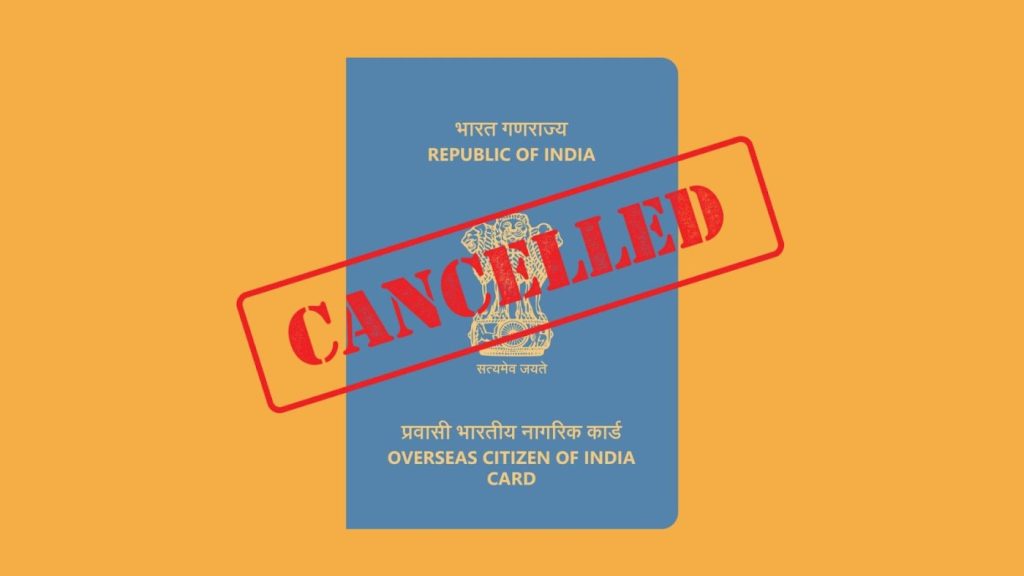
Modi government is canceling Indian visas of Indian immigrant critics. Human Rights Watch
The Indian government reclassified 4.5 million Indian immigrant cardholders as foreign nationals
New York ( Web News )
Human Rights Watch, an international human rights organization, has said that India’s Modi
government is canceling the Indian visas of Indian immigrant critics. Prime Minister Narendra Modi
often celebrates Indian democracy in America, Europe, Australia and other countries. In places
supporters of the party attend mass meetings of immigrants, while his government has targeted those it
claims are tarnishing the country’s image.Human Rights Watch According to a recent report by the
Overseas Citizen of India (OCI), the status of Overseas Citizen of India (OCI) is granted to foreign
nationals of Indian origin or foreign nationals married to Indian nationals, so that they can enjoy
extended residency rights and bypass visa requirements. can be done However, this does not equate to
citizenship rights. According to a report by Human Rights Watch, many of those who have been denied
OCI visa status are Indian-origin academics, activists and journalists who belong to the BJP. have been
openly critical of the Hindu majority ideology. Some people have challenged this action in Indian courts
on constitutional grounds, demanding freedom of expression and protection of their rights to livelihood.
Pearson said, the Indian government’s action against expatriate Indians critical of the BJP’s abusive and
discriminatory policies reflects its attitude towards criticism and dialogue. The authorities seem willing
to crack down politically on everyone from Indian activists and academics to foreign nationals of Indian
origin living abroad. The BJP-led Indian government has been cracking down on NRIs in recent years.
So the visa status has become more cautious. In 2021, the government reduced the facilities of 4.5
million OCI card holders by reclassifying them as foreign nationals and now allowing them to conduct
research and journalism or visit any area of India listed as protected. require special permission. In the
last decade, the government has reportedly rejected more than a hundred permits and deported some
NRIs to express dissatisfaction with the constitution. This has raised concerns for OCI card holders,
whether they are residing in India or abroad. Many of them have elderly parents and some have strong
personal ties to India. Indian-origin Swedish academic Ashok Swain had his OCI status revoked in 2022.
He appealed against this in the Delhi High Court, in which the court ruled in his favor saying that the
government had not given any reason for its action. Subsequently, in July 2023, the Indian Consulate in
Sweden A fresh order was sent to Swain to revoke his OCI status without providing necessary evidence
on the grounds that his social media posts hurt religious sentiments and sought to destabilize the social
fabric of India. In September 2023, officials challenged the order, claiming they had received secret
inputs from security agencies. In February 2024, Swain’s X (formerly Twitter) account was blocked in
India and later hacked. Swain told Human Rights Watch, “My case was not intended to intimidate other
academics outside of India or to criticize the government.” is used as an example to compel to do. They
want to create fear because people want a chance to go back to the country. Indian authorities have also
barred OCI card holder academics from entering the country. On February 23 of this year, authorities
stopped British professor Natasha Cole from the University of Westminster in London from entering
India. Cole said that the immigration authorities did not tell her the reason for this action. But the
spokesperson of the Ministry of External Affairs later said in response to a question about the matter
that the entry of foreign nationals into our country is a sovereign decision. Unidentified government
officials also told the media that Cole had protested against India. Notably, Cole has been a vocal critic of
the BJP and its affiliated groups and in 2019, she spoke before the United States House Committee on
Foreign Affairs about human rights violations in Jammu and Kashmir. Cole told Human Rights Watch
that he had received numerous online rape and death threats from pro-BJP trolls in India and abroad.
Apart from the threats, he said, they called me a jihadi and Terrorists have also said. There has been
widespread deliberate propaganda against me because my work has been critical of India’s ruling party,
making me pro-Pakistan. Citing criticism of the BJP government’s policies openly. British activist Amrit
Wilson’s petition, which challenged the cancellation of his visa, was followed by the government’s social
media post about Kashmir. and cited an article condemning the police’s use of excessive force against
protesting farmers in 2020 and 2021. Indian officials said about 25 foreigners with OCI status working
in India by January 2024 are increasingly using political tactics against journalists, entangling them in
opaque bureaucracy or simply refusing to allow them to continue reporting. French journalist Vanessa
Dognec, who has lived in India for 22 years, said that in January He left the country after the Ministry of
Home Affairs sent him a show cause notice as the government’s intention was to cancel his OCI card. He
was told that he did not have a permit to work as a journalist and that his news had created a biased and
negative impression of India. Permission was not granted. And despite their repeated requests, the
ministry has not responded to explain or revise its decision. OCI status of an American journalist in 2023
shortly after publishing a report on the criminal activities of an Indian company. was cancelled. The
American journalist, speaking on condition of anonymity, told Human Rights Watch that no specific
charges had been brought against him and no evidence had been produced despite his repeated requests.
American Sikh journalist Angad Singh was also deported by the authorities in 2022. After Singh filed a
lawsuit to challenge the decision, the government told the Delhi High Court that it had used India’s
secular credentials in a 2020 documentary about the 2019-20 protests against the country’s amended
citizenship law. A very negative view has been presented about it.

